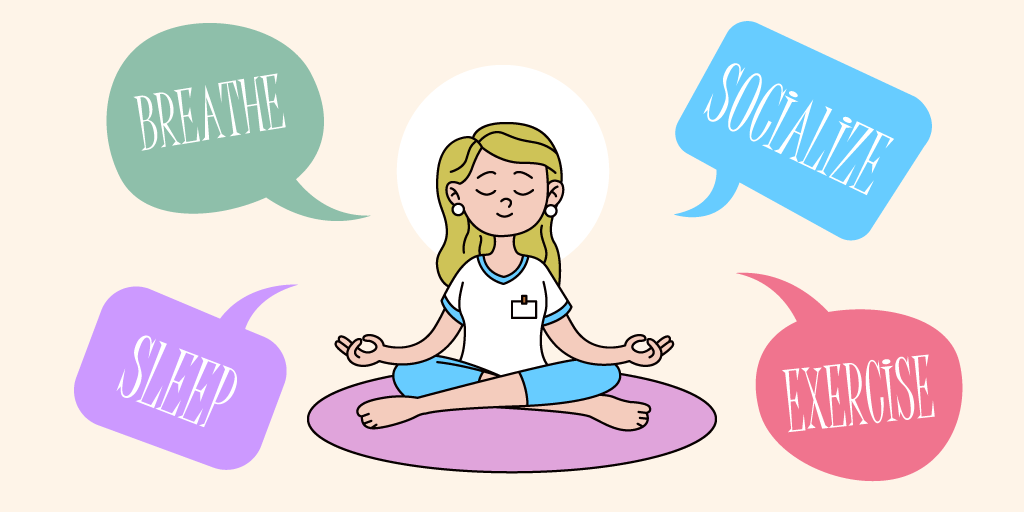Stress: Ways to Ease Stress
Ways to Ease Stress

S
tress is often viewed as an exclusively negative sensation: Work deadlines pile up, family drama takes its toll, busy schedules wear us thin and we wind up drained.
Stress occurs when someone feels an imbalance between a challenge and the resources they have to deal with it, says Kathleen Gunthert, a professor of psychology at American University. Researchers have identified two different types of stress — ‘distress,’ which refers to negative stress (a breakup) and ‘eustress,’ which refers to positive stress (starting a new job).
Chronic stress — defined as “the physiological or psychological response to a prolonged internal or external stressful event,” according to the American Psychological Association — has been linked to unhealthy eating, skin problems, smaller brain size, and even an increased likelihood of chronic disease.
In small doses, however, experts say stress can actually have some positive effects. Moderate levels of daily, manageable stress — also known as ‘eustress’ — may help protect against oxidative damage, which is linked to aging and disease, a 2013 study published in Psychoneuroendocrinology found.
Here are some unexpected upsides to experiencing a little bit of stress.
Stress enhances motivation
While heightened stress can feel overwhelming and decrease motivation, a little bit can go a long way when it comes to kickstarting your work. “Medium levels of stress can enhance our motivation,” Gunthert says. For example, the stress of a deadline can help people focus and pay more attention because time is running out. “We have all had the experience saying, ‘oh I’ve got to get such and such done’ but not being able to find the motivation to do it until we are stressed because it is due the next day and all of a sudden the motivation is there,” she says. “That fight or flight response can kick us into gear sometimes.”
Stress can build resilience and encourage growth
Even though stress can feel overwhelming, it also forces people to problem-solve, ultimately building confidence and skills that are important for future experiences, says Peter Vitaliano, professor of psychiatry and behavioral sciences at the School of Medicine at the University of Washington. With increased resiliency and confidence, people tend to feel less threatened and more in control of their situations, he says.
Allison Berwald, a licensed clinical social worker in New York City, says that using stress to face your fears or challenges can also help you work through experiences instead of avoiding them. After facing a fear, you will feel more equipped to handle it in the future, since you have already experienced it, she says.
Stress can promote bonding
One of the most surprising benefits of stress is that it can help build interpersonal relationships, which are key to overall health. “Social connection is one of the most protective factors against physical and mental health problems,” Gunthert says. When people feel loved and understood by another person, they feel less alone and isolated.
Support groups, for example, are a great place for people to talk about their stresses with others, which builds compassion and, in turn, positive hormones, Vitaliano says. By opening up to one another, Vitaliano says that people feel better because they can relate to each other’s struggles and validate their feelings, creating positivity out of a negative experience.
Talking to friends and family can build and strengthen relationships too. “A lot of our friendships or family relationships wouldn’t be the same if we hadn’t supported each other through some of the tougher times,” says Gunthert.
Stress is part of a meaningful life
A life without stress isn’t necessarily better. Take, for example, a student in graduate school. The application process is competitive, the coursework can be challenging and after graduation, transitioning from an academic setting to a business one can be a learning process. However, in the end, one accomplished something to be proud of, says Gunthert. “The things that we are most proud of and bring the most meaning in our lives are hard,” she says. “If we wipe out the stress, we’d also likely wipe away a lot of the meaning in our lives.”
MORE MUST-READ STORIES FROM TIME
- Amanda Gorman on the Greatest Lesson She’s Learned This Year
- What Actually Worries U.S. Doctors About Omicron
- Reuniting Families Separated Under Trump Is Expensive. Should the U.S. Government Pay?
- The 10 Best Movies of 2021
- America's Foster Care System Is a Dangerous Place for Trans Teens. Now They're Fighting for Change
- Stressed About Going Back to the Office? Here Are 8 Ways to Make It Easier
- What to Know About Digital World, the Company Funding Trump's New Social Media Platform 'TRUTH Social'










Share On: